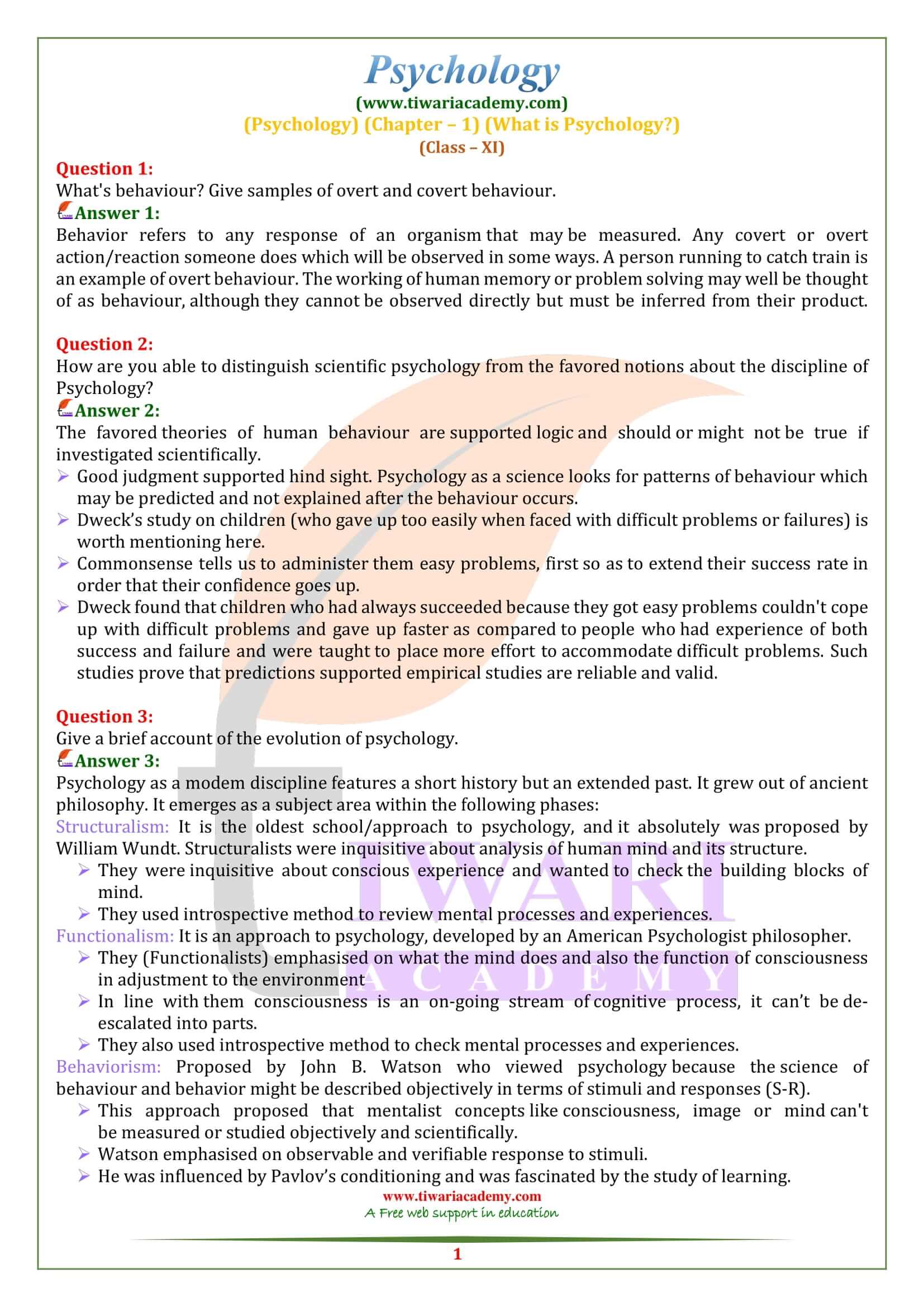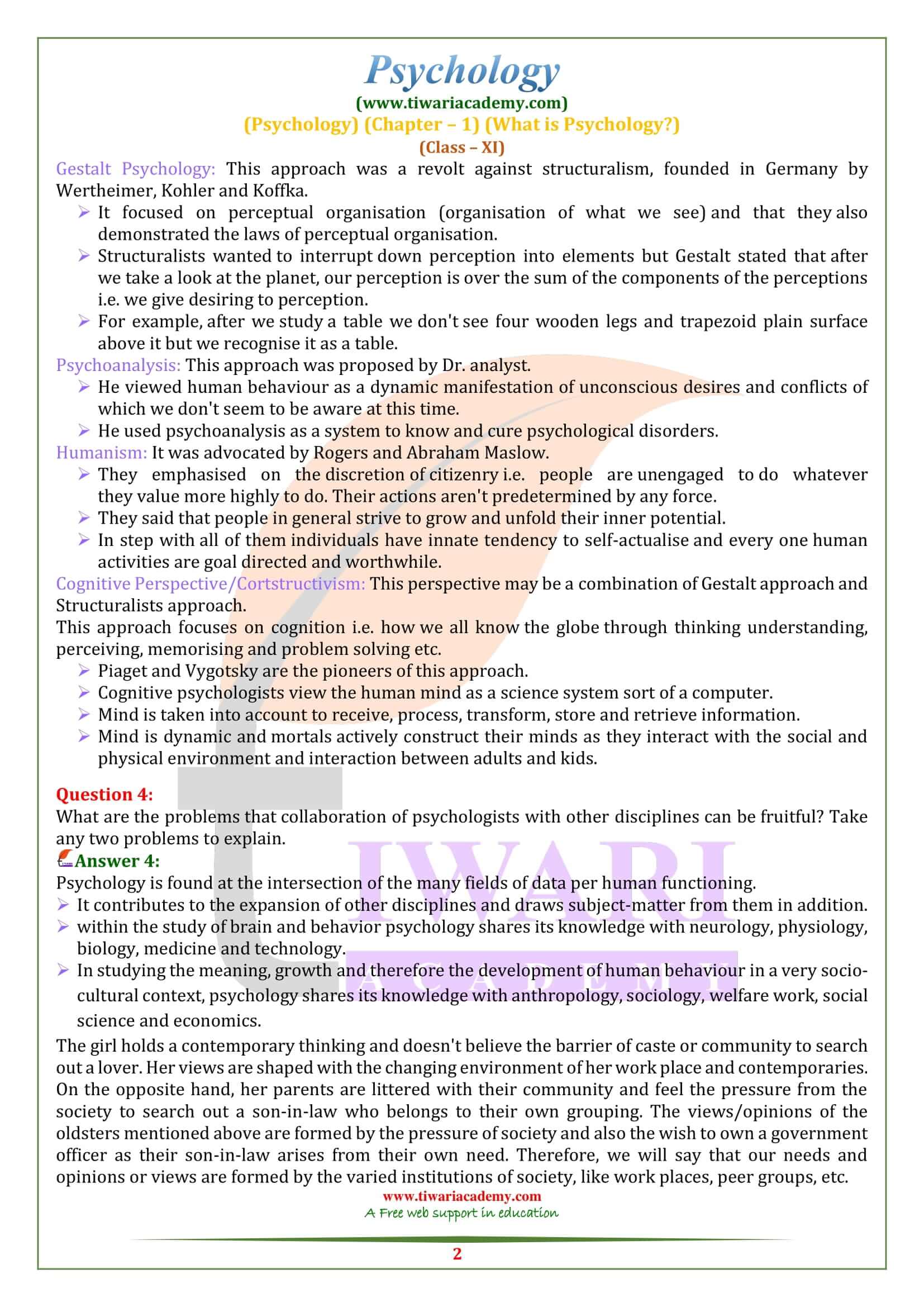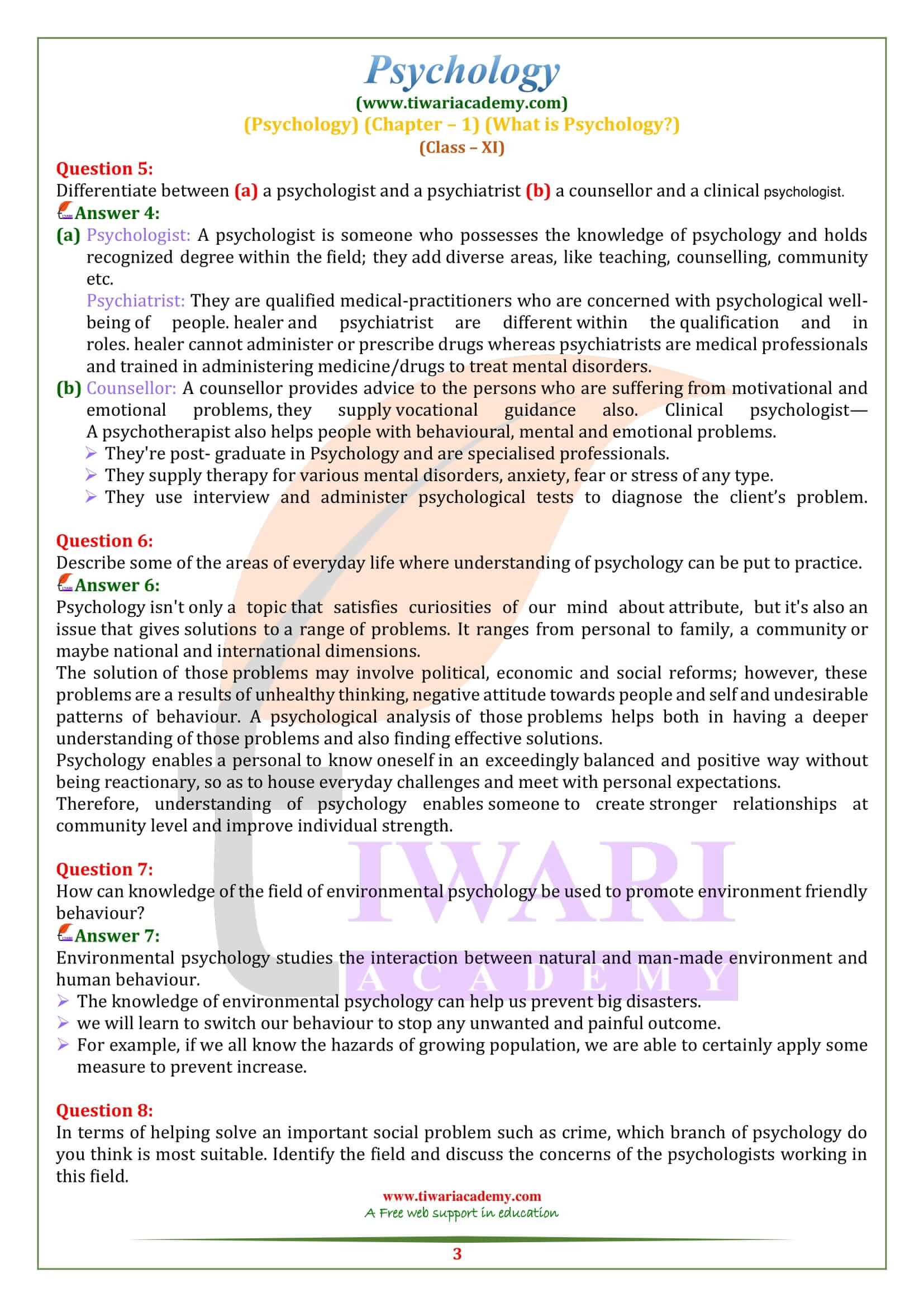NCERT Solutions for Class 11 Psychology Chapter 1 What is Psychology? English Medium updated for CBSE 2025-26. Get here important questions and MCQ of 11th Psychology chapter 1 along with the NCERT textbook solutions.
NCERT Solutions for Class 11 Psychology Chapter 1
Class 11 Psychology Chapter 1 What is Psychology? Question Answers
What’s behaviour? Give samples of overt and covert behaviour.
Behavior refers to any response of an organism that may be measured. Any covert or overt action/reaction someone does which will be observed in some ways. A person running to catch train is an example of overt behaviour. The working of human memory or problem solving may well be thought of as behaviour, although they cannot be observed directly but must be inferred from their product.
How are you able to distinguish scientific psychology from the favored notions about the discipline of Psychology?
The favored theories of human behaviour are supported logic and should or might not be true if investigated scientifically.
- Good judgment supported hind sight. Psychology as a science looks for patterns of behaviour which may be predicted and not explained after the behaviour occurs.
- Dweck’s study on children (who gave up too easily when faced with difficult problems or failures) is worth mentioning here.
- Commonsense tells us to administer them easy problems, first so as to extend their success rate in order that their confidence goes up.
- Dweck found that children who had always succeeded because they got easy problems couldn’t cope up with difficult problems and gave up faster as compared to people who had experience of both success and failure and were taught to place more effort to accommodate difficult problems. Such studies prove that predictions supported empirical studies are reliable and valid.
Give a brief account of the evolution of psychology.
Psychology as a modem discipline features a short history but an extended past. It grew out of ancient philosophy. It emerges as a subject area within the following phases:
Structuralism: It is the oldest school/approach to psychology, and it absolutely was proposed by William Wundt. Structuralists were inquisitive about analysis of human mind and its structure.
They were inquisitive about conscious experience and wanted to check the building blocks of mind.
They used introspective method to review mental processes and experiences.
Functionalism: It is an approach to psychology, developed by an American Psychologist philosopher.
They (Functionalists) emphasised on what the mind does and also the function of consciousness in adjustment to the environment
In line with them consciousness is an on-going stream of cognitive process, it can’t be de-escalated into parts.
They also used introspective method to check mental processes and experiences.
Behaviorism:
Proposed by John B. Watson who viewed psychology because the science of behaviour and behavior might be described objectively in terms of stimuli and responses (S-R).
- This approach proposed that mentalist concepts like consciousness, image or mind can’t be measured or studied objectively and scientifically.
- Watson emphasised on observable and verifiable response to stimuli.
- He was influenced by Pavlov’s conditioning and was fascinated by the study of learning.
Gestalt Psychology:
This approach was a revolt against structuralism, founded in Germany by Wertheimer, Kohler and Koffka.
It focused on perceptual organisation (organisation of what we see) and that they also demonstrated the laws of perceptual organisation.
Structuralists wanted to interrupt down perception into elements but Gestalt stated that after we take a look at the planet, our perception is over the sum of the components of the perceptions i.e. we give desiring to perception.
For example, after we study a table we don’t see four wooden legs and trapezoid plain surface above it but we recognise it as a table.
Psychoanalysis:
This approach was proposed by Dr. analyst.
He viewed human behaviour as a dynamic manifestation of unconscious desires and conflicts of which we don’t seem to be aware at this time.
He used psychoanalysis as a system to know and cure psychological disorders.
Humanism:
It was advocated by Rogers and Abraham Maslow.
- They emphasised on the discretion of citizenry i.e. people are unengaged to do whatever they value more highly to do. Their actions aren’t predetermined by any force.
- They said that people in general strive to grow and unfold their inner potential i.e. what they’re capable of doing.
- In step with all of them individuals have innate tendency to self-actualise and every one human activities are goal directed and worthwhile.
Cognitive Perspective/Cortstructivism:
This perspective may be a combination of Gestalt approach and Structuralists approach.
This approach focuses on cognition i.e. how we all know the globe through thinking understanding, perceiving, memorising and problem solving etc.
- Piaget and Vygotsky are the pioneers of this approach.
- Cognitive psychologists view the human mind as a science system sort of a computer.
- Mind is taken into account to receive, process, transform, store and retrieve information.
- Mind is dynamic and mortals actively construct their minds as they interact with the social and physical environment and interaction between adults and kids.
Differentiate between (a) a psychologist and a psychiatrist (b) a counsellor and a clinical psychologist.
(a) Psychologist: A psychologist is someone who possesses the knowledge of psychology and holds recognized degree within the field; they add diverse areas, like teaching, counselling, community etc.
Psychiatrist: They are qualified medical-practitioners who are concerned with psychological well-being of people. healer and psychiatrist are different within the qualification and in roles. healer cannot administer or prescribe drugs whereas psychiatrists are medical professionals and trained in administering medicine/drugs to treat mental disorders.
(b) Counsellor: A counsellor provides advice to the persons who are suffering from motivational and emotional problems, they supply vocational guidance also. Clinical psychologist—A psychotherapist also helps people with behavioural, mental and emotional problems.
- They’re post- graduate in Psychology and are specialised professionals.
- They supply therapy for various mental disorders, anxiety, fear or stress of any type.
- They use interview and administer psychological tests to diagnose the client’s problem.
Describe some of the areas of everyday life where understanding of psychology can be put to practice.
Psychology isn’t only a topic that satisfies curiosities of our mind about attribute, but it’s also an issue that gives solutions to a range of problems. It ranges from personal to family, a community or maybe national and international dimensions.
The solution of those problems may involve political, economic and social reforms; however, these problems are a results of unhealthy thinking, negative attitude towards people and self and undesirable patterns of behaviour. A psychological analysis of those problems helps both in having a deeper understanding of those problems and also finding effective solutions.
Psychology enables a personal to know oneself in an exceedingly balanced and positive way without being reactionary, so as to house everyday challenges and meet with personal expectations.
Therefore, understanding of psychology enables someone to create stronger relationships at community level and improve individual strength.
In terms of helping solve an important social problem such as crime, which branch of psychology do you think is most suitable. Identify the field and discuss the concerns of the psychologists working in this field.
The branch of psychology is that the most fitted for solving problems like crime. It explores through thought process of individuals and their influence on other. Social psychologists are concerned with topics like attitude, conformity, obedience to authority, social motivation, inter-group relations, etc.
Psychiatrists can provide psychological treatments to people with mental state. Psychologists, some GPs, social workers, psychological state nurses, counsellors and other therapists also offer psychological treatments. A second way during which sociologists can contribute to the solving of social problems and yet remain objective is to review the aspects of a social problem that prevent it from being solved. That is, sociologists can help us to become more awake to the barriers that prevent a social problem from being solved.





